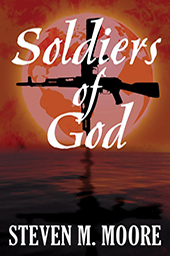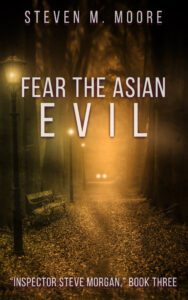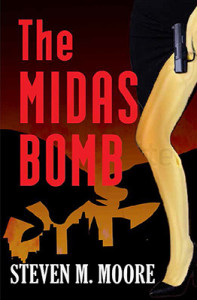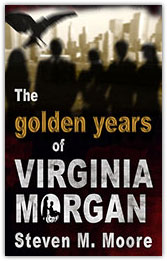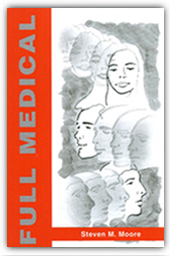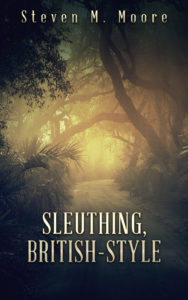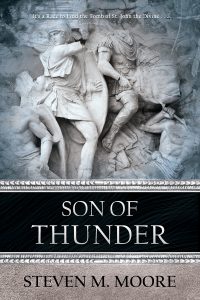Humor in sci-fi…
Wednesday, October 18th, 2023…is rare but probably more common that a lot of people might believe. I’m not talking about the awful slapstick humor found in space operas (Han’s interactions with Leia, for example, are pathetic) but quality humor dealing with the human (and ET?) condition. Damon Knight’s “To Serve Man” is a short story that created a classic Twilight Zone episode, for example. From C. M. Kornbluth’s “Marching Morons” (no, that famous novella isn’t about the MAGA minions who follow that “f&^%ing moron”—ex-SecState Tillerson’s quote is one of the best to come out of that awful president’s administration, by the way) to the robot in a classic TV series (“Danger, danger, Will Robinson”), a reader, viewer, or reviewer can find all brands of humor (the Knight and Kornbluth examples are political irony, of course). And sci-fi authors often make fun of the past and present with their tales about the future, often at the expense of the VIPs from that past or present.
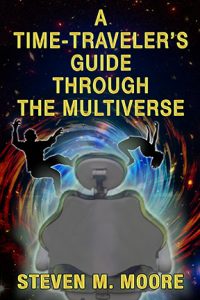 You’d think that predicting the future is serious business, of course, but extrapolating current or past events in a way they can be lampooned (both classic sci-fi examples above do that) is a special art. I’ll admit I’m not very good at it, but I’ve done my share. Most of my efforts can be found in my short fiction (short stories and novellas) buried in a few published collections and a lot of free PDF downloads (see the “Free Stuff & Contests” web page). There’s also A. B. Carolan’s The Secret Lab. Its very title is a bit impish, something a few reviewers missed entirely and then repeated their errors with The Secret of the Urns, if memory serves. And if a mutant cat who can teach kids calculus doesn’t tickle your funny bone, you don’t have a sense of humor, let alone appreciate humor in sci-fi.
You’d think that predicting the future is serious business, of course, but extrapolating current or past events in a way they can be lampooned (both classic sci-fi examples above do that) is a special art. I’ll admit I’m not very good at it, but I’ve done my share. Most of my efforts can be found in my short fiction (short stories and novellas) buried in a few published collections and a lot of free PDF downloads (see the “Free Stuff & Contests” web page). There’s also A. B. Carolan’s The Secret Lab. Its very title is a bit impish, something a few reviewers missed entirely and then repeated their errors with The Secret of the Urns, if memory serves. And if a mutant cat who can teach kids calculus doesn’t tickle your funny bone, you don’t have a sense of humor, let alone appreciate humor in sci-fi.
A better example from my opus is A Time Traveler’s Guide through the Multiverse. This novel is hard sci-fi in the sense that it’s time travel done right (no paradoxes here if you can get beyond the “time machine” being an old dentist’s chair), but it’s a sci-fi rom-com as well that might serve well as a TV soap opera (if it passed the censors, of course, because it also intentionally lampoons a lot of past and current events).
I’ve looked for other examples of humor in sci-fi. Sure, there are bits and pieces here and there, but it isn’t all that common. Maybe we should write more humorous sci-fi stories? There are certainly a lot of politicians and other VIPs in compromising situations to lampoon!
***
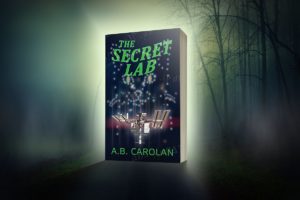 Comments are always welcome. (Please follow the rules on the “Join the Conversation” web page.)
Comments are always welcome. (Please follow the rules on the “Join the Conversation” web page.)
Sci-fi mysteries for young adults from A. B. Carolan. Assuming these books aren’t banned in your area (or burned?) because some idiot finds them offensive, I believe these novels are appropriate for young adults (and adults who are young at heart!). They extrapolate today’s 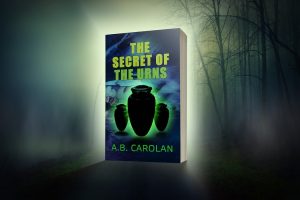 trials and tribulations for tweens and teens into the far future to allow serious yet sometimes humorous discussions (and quality book reports at schools not participating in book banning). The first three, The Secret Lab, The Secret of the Urns, and Mind Games, take huge steps along the fictional future history timeline found in my more serious sci-fi novels, The last one, Origins, supposedly the first in a trilogy, must stand alone for now until A. B. finishes the last two novels in the trilogy, and it does that quite well with all its action restricted to Earth and a conspiracy involving ancient hominids. Available wherever quality ebooks are sold (some of them even on Amazon).
trials and tribulations for tweens and teens into the far future to allow serious yet sometimes humorous discussions (and quality book reports at schools not participating in book banning). The first three, The Secret Lab, The Secret of the Urns, and Mind Games, take huge steps along the fictional future history timeline found in my more serious sci-fi novels, The last one, Origins, supposedly the first in a trilogy, must stand alone for now until A. B. finishes the last two novels in the trilogy, and it does that quite well with all its action restricted to Earth and a conspiracy involving ancient hominids. Available wherever quality ebooks are sold (some of them even on Amazon).
Around the world and to the stars! In libris libertas!
